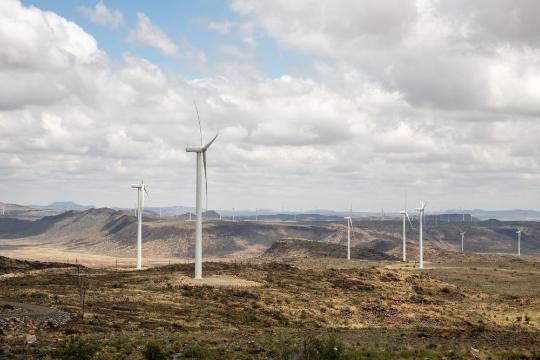Extensive renewable energy collaboration foreseen
China and Africa are poised for extensive collaboration in the realm of renewable energy, as the continent's abundant resources align with China's advanced expertise in wind and solar power technologies, said experts recently.
This partnership not only guarantees energy security but also propels Africa toward green, low-carbon practices and sustainable development, yielding a host of mutually beneficial outcomes, they said.
Currently, the African economy is undergoing sustained growth with a continuous rise in energy demand. According to the Continental Power System Masterplan currently being developed by the African Union Development Agency, Africa's electricity consumption may reach 3,842 terawatt-hours by 2040.
The International Renewable Energy Agency predicts that by 2030, nearly a quarter of Africa's energy demand can be met by new energy sources.
While Chinese companies have implemented hundreds of renewable energy projects in Africa, aiding African nations in mitigating energy shortages and achieving sustainable development, experts said that the localization of technology and production, as well as green finance and talent development can further deepen and broaden China-Africa renewable energy cooperation.
Lu Junling, chief economist at China's National Energy Administration, said that energy cooperation between China and Africa aligns with the mutual interests of both parties, offering a solid foundation and promising prospects. He advocated for enhanced practical cooperation facilitation for future China-Africa energy projects, emphasizing the importance of exchanging energy project information, creating collaboration opportunities and maximizing the role of energy think tanks to realize more cooperative outcomes.
"Now is an opportune moment for clean energy collaboration between China and Africa. Further efforts are needed to advance the cooperation mechanisms between the two regions, help with planning research and policy alignment, foster deeper technological innovation cooperation, and explore tailored green projects that benefit communities," said Li Sheng, head of the China Renewable Energy Engineering Institute.
A recent report on China-Africa renewable energy cooperation, jointly prepared by the CREEI and the New Partnership for Africa's Development, an economic program of the African Union, underscores Africa's significant potential in renewable energy development, while highlighting the need for improvements in production and consumption levels. In 2022, renewable energy accounted for a modest 9.67 percent of its total energy consumption.
Regarding production, Africa's total installed power generation capacity reached 252.8 gigawatts in 2023, with fossil fuels remaining the primary electricity source, constituting about three-quarters of total installed capacity. Among renewable energy sources, hydropower (excluding pumped storage) had an installed capacity of 37.1 GW, representing 3 percent of global hydropower capacity, while wind and solar power capacities were 8.7 GW and 13.5 GW, respectively, each accounting for less than 1 percent globally.
However, over the past five years, Africa's total installed capacity of renewable energy, excluding pumped storage, has grown by 23.2 percent, a substantial 16.8 percentage points higher than the growth rate of fossil fuel power generation capacity (6.4 percent) during the same period.

